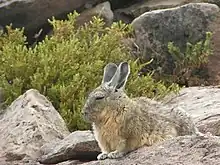viscacha
English

a typical viscacha Lagidium viscacia
Pronunciation
Noun
viscacha (plural viscachas)
- Any of the several South American rodents, native to the Andes, of the genera Lagidium and Lagostomus, within family Chinchillidae.
- 1836, Charles Frederick Partington, “Chinchillidae”, in The British Cyclopæedia of Natural History, page 27:
- From the tenderness of its covering, it is not, though a stronger and larger animal, so able to bear the severity of winter in the Andes as the Chinchilla, though it is not so decidedly an animal of the plains as the viscacha of Paraguay.
- 1837, Conrad Malte-Brun, Jean-Jacques-Nicolas Huot, A System of Universal Geography, page 316:
- The guanaco, the viscacha, and the hare of the Pampas, are found in Patagonia.
- 2003, Elaine Egbert, Nature in a Nutshell: Daily Devotions for Juniors, page 236:
- A guard viscacha watches for predators. This guard sounds an alarm if it spots danger. Then the quick-moving viscachas scramble into their dens in the rocks or burrow into the ground.
- 2013, James G. Sanderson, Patrick Watson, Small Wild Cats: The Animal Answer Guide, unnumbered page:
- The Andean cat's prey is small mammals such as the mountain viscacha, which look very much like a common North American cottontail rabbit. Mountain viscachas eat coarse spikegrass that is found near small mountain streams.
Synonyms
Derived terms
Related terms
Translations
rodents of the genera Lagidium and Lagostomus, within family Chinchillidae
|
This article is issued from Wiktionary. The text is licensed under Creative Commons - Attribution - Sharealike. Additional terms may apply for the media files.